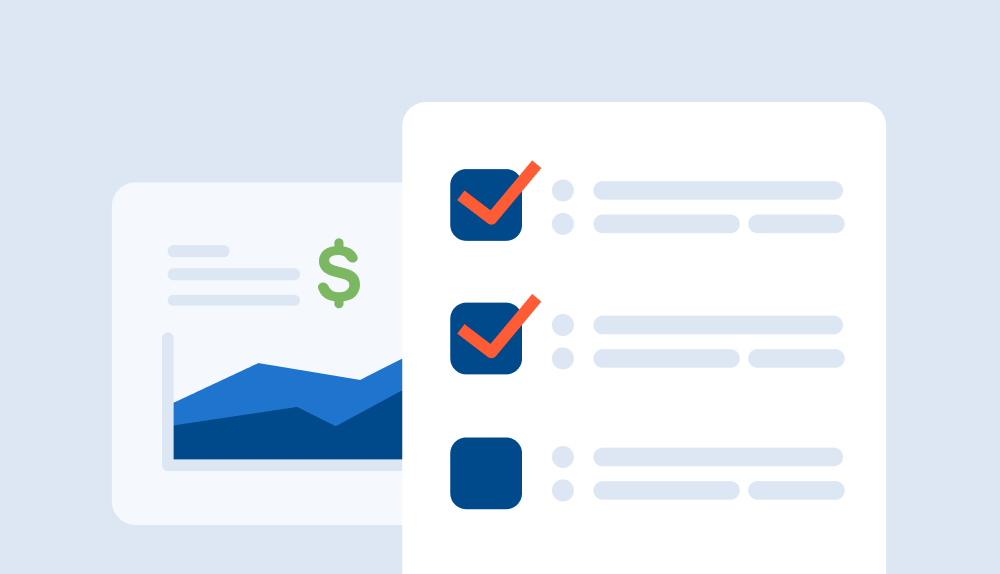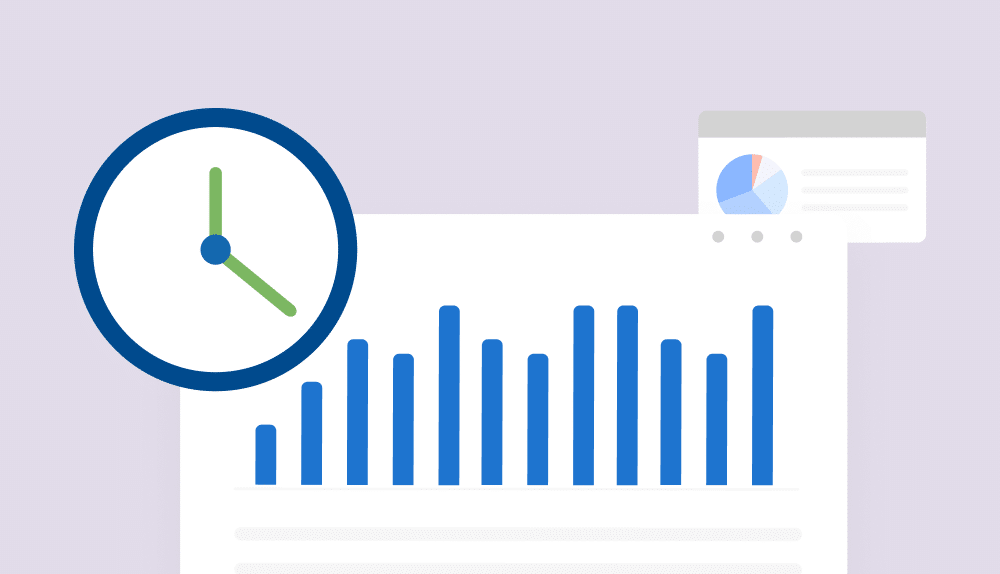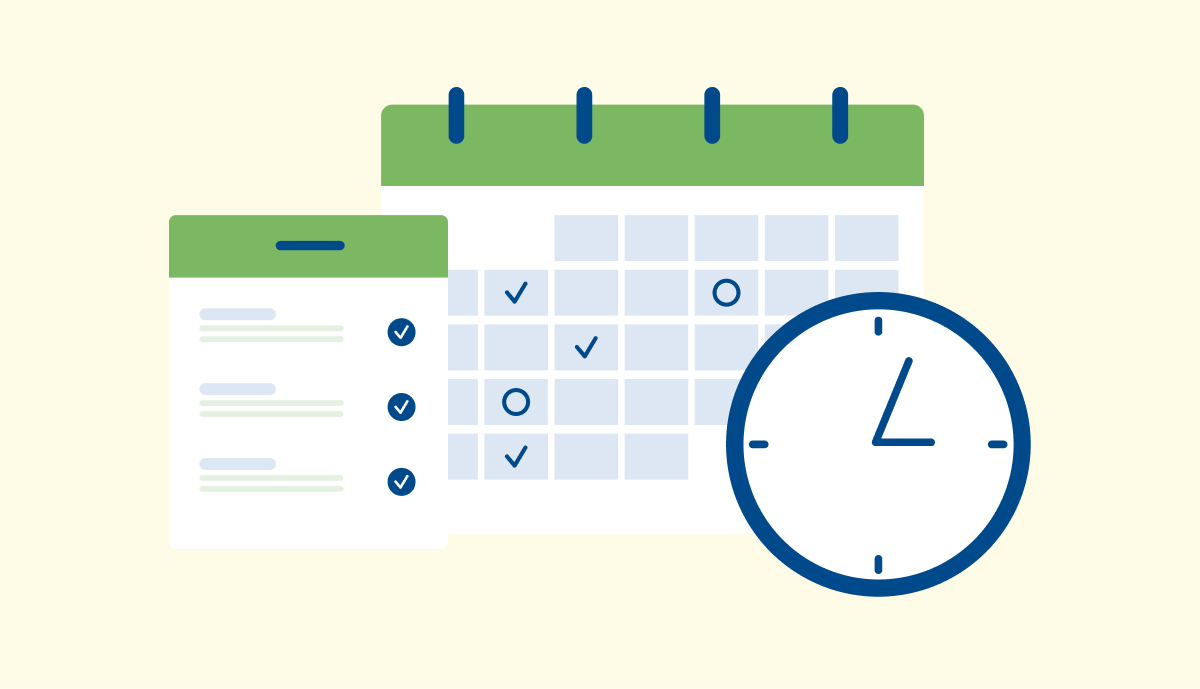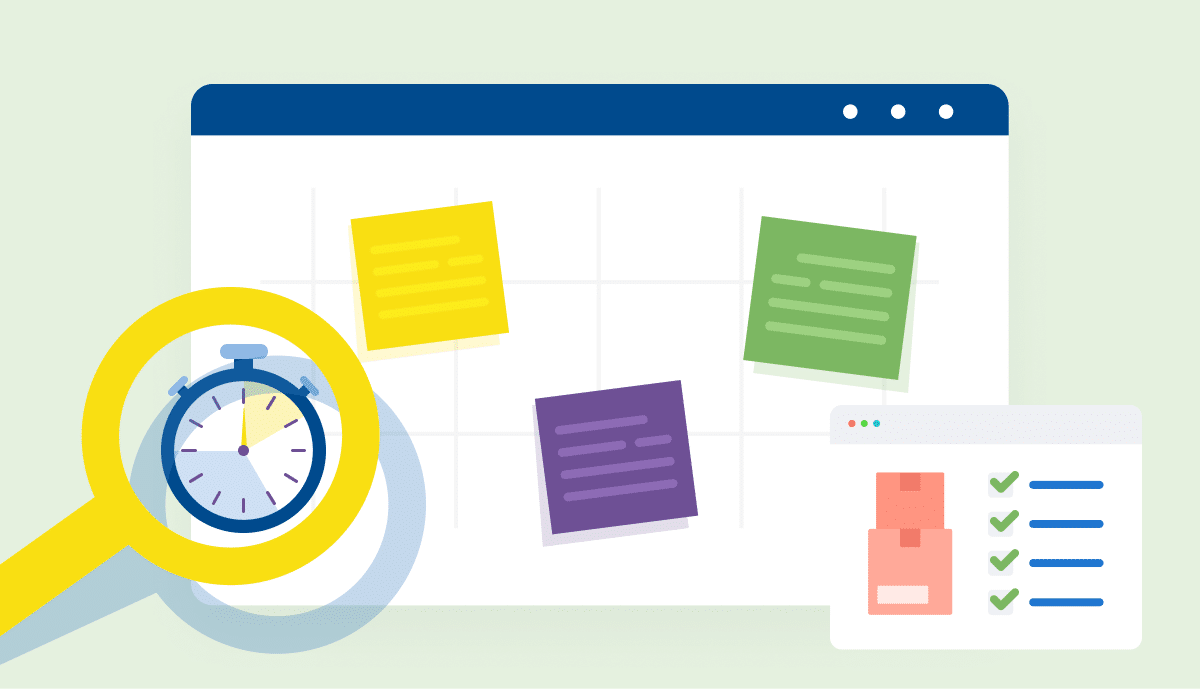With the growing need for efficiency in 2024, choosing the right Time Tracking software is essential for businesses, especially in the professional services industry. While standalone tools offer helpful insights, Time Tracking software within a Professional Services Automation (PSA) system, like BigTime, delivers unmatched value. BigTime not only integrates time tracking with project management and financial oversight but also provides a complete, end-to-end solution that streamlines operations and enhances decision-making.
By using time tracking as part of a PSA system, businesses gain real-time visibility into how time is spent across projects, teams, and tasks. This allows for smarter resource allocation, increased productivity, and improved profitability. As remote and hybrid work environments continue to evolve, an integrated solution like BigTime ensures your business remains competitive, aligning time management with overall business goals while simplifying billing and project oversight.
This article will cover the benefits of Time Tracking software, key features to look for, and how to find the right solution — whether as a standalone tool or part of a PSA system.
Top 10 Benefits of Employee Time Tracking Software for Better Business Efficiency
First, let’s explore some of the many benefits Time Tracking software can provide to a professional services organization.
Let’s start by exploring 10 (of many) benefits Time Tracking software offers to professional services organizations:
1. Boost Productivity
Time Tracking software helps people focus on important tasks by reducing distractions. It allows managers to find inefficiencies and reassign resources. This ensures team members work on the most valuable activities, leading to better productivity.
2. Enhance Billing Accuracy Through Time Tracking on Tasks for Project Management
By ensuring that every billable hour is accurately tracked, Time Tracking software improves the precision of client billing. This transparency builds trust with clients by showing exactly how their time is being spent, minimizing disputes and delays in payment.
3. Elevate Project Management & Task Allocation
With real-time insights into how time is used, managers can allocate tasks and resources more strategically. This leads to better project management outcomes, reduced bottlenecks, and more efficient use of team capacity.
4. Increase Transparency in Remote Work
Time tracking tools help businesses watch how productive remote teams are without micromanaging. They promote transparency and accountability. This allows managers to see project progress and make sure deadlines are met, even with distributed teams.
5. Improve Resource Allocation
Detailed time tracking data helps ensure that resources are allocated appropriately. Managers can better balance workloads and prevent burnout. They can also ensure that important projects get the attention they need.
6. Cut Costs & Improve Profitability
By identifying areas where time—and therefore money—is being wasted, Time Tracking software helps businesses reduce inefficiencies. This can lead to significant cost savings while increasing profitability by maximizing billable hours and reducing unproductive time.
7. Streamline Payroll & Timesheet Management
Automating the timesheet process cuts down on manual errors and saves time. It also makes payroll processing easier. With accurate and timely payroll, Time Tracking software reduces admin work. This ensures employees are paid correctly and on time.
8. Enable Data-Driven Decisions
Time Tracking software provides robust reports that offer deep insights into employee performance and project progress. These data-driven insights allow managers to make informed decisions, identify trends, and adjust strategies to improve both individual and team productivity.
9. Improve Workflow Efficiency & Team Collaboration
A clear view of how time is spent helps businesses optimize workflows. By identifying bottlenecks and inefficiencies, managers can adjust workflows to ensure smoother collaboration and better coordination between team members.
10. Build Client Trust Using Time Tracking
Providing clients with detailed, transparent reports on how their time is being spent enhances trust and confidence. Clients can see where their investment is going, which strengthens relationships and leads to better long-term partnerships.

How to Choose the Best Time Tracking App for Your Business Needs
Choosing the right Time Tracking software is key to boosting productivity, streamlining operations, and driving profitability. Whether you’re managing a small team or large projects, the right tool gives you real-time insights, helping you make smarter decisions and keep costs in check.
For professional services firms, tracking hours is important, but it’s not the only thing. Using a Professional Services Automation (PSA) system like BigTime helps. This system tracks time and manages project workflows. It also helps with resource planning and financials. Every hour tracked connects to a project, budget, and client. This gives firms full visibility into their operations.
With so many options, finding features that fit your business and workflows is crucial. Here, we’ll guide you through choosing the best Time Tracking software to keep your team working smarter and staying on track.
1. Identify Your Business’s Time Tracking Needs
Some businesses may only need basic time tracking for payroll. Others might need advanced features like project management, expense tracking, and detailed reports. Knowing what your business needs will help you choose the right software. This will make sure it solves your problems effectively.
For example, a small business might want something simple and easy to use. A larger business may need advanced reports, real-time budget tracking, and project-based time logs. Also, think about how many users will be using the software. Consider the complexity of your projects to ensure the software can grow with your business and your projects to ensure the software can grow with your business.
Questions to ask yourself:
- Does my business need advanced time tracking for project management, or will basic time logs suffice?
- Do I need software that can track both billable and non-billable hours separately?
- Will mobile access be important for remote employees or field teams to log time and expenses from different locations?
- Do I need time tracking to be integrated with payroll or invoicing to simplify billing processes?
- How much customization do I need in terms of reporting? Do I require tailored reports for clients or internal performance tracking?
- Will I need to track time across multiple projects and allocate resources effectively?
BigTime Tip: Think beyond tracking time. If your business needs more than logging hours, a PSA system can help. It combines time tracking with project and financial management. This keeps all parts of your operations connected.
2. Key Features to Look for in Time Tracking Software
Assessing the features is one of the most important steps when choosing Time Tracking software. Different tools offer varying capabilities, so you’ll want to focus on those that align with your business’s needs. Below are key features to consider when evaluating a time tracking solution:
- Mobile Access: Make sure your team can log time and expenses from anywhere using an employee time tracking app. This is helpful for companies with remote workers or those in the field who need flexible tracking.
- Real-Time Tracking: Tracking time in real-time gives you a clear view of ongoing projects. This allows for quick changes and smart decisions to keep tasks on track.
- Expense Tracking Integration: SometimesTime Tracking software also tracks expenses, which helps with project billing. With BigTime, time and expenses are recorded together, ensuring accurate and easy invoicing.
- Resource Allocation and Capacity Planning: A good time tracking tool should have features for managing resources. This is especially important in a Professional Services Automation (PSA) system. BigTime helps you allocate resources better by showing team availability, skills, and workload. This ensures the right people are assigned to the right tasks. It also prevents overworking or underworking team members.
- Customizable Reporting: Detailed reports are important for analyzing productivity, resource use, and project profits. Choose software that lets you customize reports to fit your business goals. This can include tracking project performance, billable versus non-billable hours, or team efficiency.
- Project Budgeting and Forecasting: A PSA system like BigTime helps you track time and project budgets. This makes it easier to forecast accurately. By connecting time entries to budgets, you see in real time how much time and money are spent on a project. This helps you stay on track.
- Compliance and Auditing: Choosing DCAA-compliant timekeeping software is essential for businesses that need to adhere to strict government regulations and industry standards. This type of software ensures that timekeeping practices meet Defense Contract Audit Agency (DCAA) requirements, which is crucial for government contractors. Features like automated timesheets, audit trails, and real-time reporting provide accuracy and transparency, reducing the risk of discrepancies during audits and ensuring compliance with labor laws and client agreements.
- Integration with Other Tools: Seamless integration with tools such as accounting software, project management platforms, or payroll systems is crucial for ensuring smooth workflows. For example, Time Tracking software that integrates with QuickBooks, like BigTime, can streamline financial processes and sync time logs directly with your billing systems.
- Client Management and Invoicing: Some time tracking solutions, like BigTime, also offer client management and invoicing features, enabling you to send accurate, detailed invoices directly from the platform. This reduces the time spent on billing and ensures that clients receive transparent, up-to-date reports on project hours and expenses.
- Scalability: As your business grows, your Time Tracking software should scale with it. Look for a solution that can accommodate increased users, more complex projects, and larger data loads without compromising performance.
Questions to ask yourself:
- Does the software offer real-time visibility into my team’s productivity and project progress?
- Can I easily generate detailed reports on project profitability, resource utilization, and performance?
- Will this tool integrate with the other software my business already relies on, such as payroll or accounting systems?
- Do I need features like resource allocation or capacity planning to optimize team performance?
BigTime Tip: Think about future growth. Even if your business is small now, choose Time Tracking software that can scale with you. A scalable solution, like BigTime, means you won’t need to switch systems as your business expands, saving you time and headaches in the future.

3. Prioritize User Experience and Ease of Adoption
No matter how powerful the features are, the software will be ineffective if your team struggles to use it. A user-friendly interface and a simple onboarding process can greatly improve adoption rates and overall satisfaction. The easier it is to log time, the more likely employees are to use the tool consistently.
Questions to ask yourself:
- How easy is it for my team to log time and access reports?
- Does the software offer customizable workflows that match how my business operates?
- Will the system require extensive training, or is it intuitive enough for quick adoption?
BigTime Tip: Prioritize simplicity. Choose software with an intuitive interface that minimizes the learning curve for your team, ensuring quick and effective use across the business.
4. Understanding Pricing and ROI
The pricing structure of Time Tracking software can vary, typically based on factors such as the number of users or the features included. However, beyond just the price tag, it’s important to assess the return on investment (ROI) the software provides. Features like automation, real-time tracking, and integration can lead to substantial time and cost savings.
Questions to ask yourself:
- Is the software priced per user or per project, and does it fit within my budget?
- How much admin time will this software save by automating time tracking and reporting processes?
- Will the software help us improve billing accuracy and reduce revenue leakage?
BigTime Tip: Focus on long-term gains. While upfront costs are important, the efficiency and productivity improvements provided by the right Time Tracking software can more than justify the investment.
5. Customer Support & Training
Access to strong customer support and training resources is essential for the successful implementation and long-term use of any software. Having a responsive support team can make a big difference, especially during setup and onboarding.
Questions to ask yourself:
- Does the provider offer ongoing customer support, such as live chat or phone assistance?
- Are there training resources available, such as tutorials or onboarding guides, to help my team get up to speed?
BigTime Tip: Look for a provider with dedicated customer success teams. Having access to knowledgeable support, especially during implementation, ensures that you can get the most out of the software and overcome any potential roadblocks.
6. Read Reviews & Request a Demo Before Making Your Decision
Reading reviews from other businesses can help you understand how the software works in real life. Customer reviews often highlight aspects like ease of use, integration capabilities, and support quality. Requesting a demo also allows you to test out the software firsthand and ensure it fits your specific needs.
Questions to ask yourself:
- Have other businesses in my industry found success with this tool?
- Can I test the software’s features through a demo before making a decision?
BigTime Tip: Use demos to assess fit. A demo gives you the chance to see how the software will work with your specific workflows. Use this opportunity to test out key features and determine if it meets your team’s needs.
The Best Time Tracking Software for Small Business Owners in 2024
The best Time Tracking software for small business owners in 2024 offers simple tools for logging hours, managing billable time, and generating reports— without overwhelming users with unnecessary complexity.
Key features to prioritize include:
- Mobile Access: Enables employees to log time from anywhere, ensuring flexibility and convenience.
- Integration with Accounting Tools: Works seamlessly with popular platforms like QuickBooks, simplifying invoicing and reducing manual data entry.
- Automation: Handles tasks such as timesheet management and expense tracking, saving time and minimizing administrative work.
- Clear Reporting: Offers detailed insights into project costs, billable hours, and team productivity, helping small businesses make informed decisions.
BigTime is a great choice for small businesses. It has clear reporting tools that show project costs, billable hours, and team productivity. This helps small businesses use their resources better and keep costs low. Good Time Tracking software helps small business owners. It simplifies operations and automates tasks. This allows them to focus on growth rather than daily administrative work.
Streamline Your Operations with Time and Expense Tracking Software
Time and Expense Tracking software is no longer just a convenience— it’s a vital tool for keeping projects on time and under budget. By integrating time tracking with expense management into a single platform, businesses gain real-time visibility into how resources are being used, making it easier to control costs and ensure projects are delivered profitably.
This type of software offers more than just tracking; it provides powerful insights that allow you to:
- Spot Inefficiencies Early: Identify areas where time and resources are being wasted, allowing you to make adjustments before they affect the bottom line.
- Track Project Costs in Real-Time: Understand exactly how much time and money have been spent on each project, helping you stay within budget and forecast more accurately.
- Ensure Accurate Client Billing: Link tracked hours and expenses directly to client invoices, reducing the risk of missed billable time and ensuring you’re compensated for all work done.
- Automate Manual Tasks: Eliminate manual data entry, reducing errors and freeing up your team to focus on higher-value tasks.
By automating these essential functions, time and expense tracking software helps businesses reduce administrative burden and improve overall efficiency. The ability to track both time and costs in one system fosters transparency and accountability across teams, helping businesses stay agile and maintain profitability even as projects grow more complex. For forward-thinking companies, leveraging these tools is key to not only streamlining operations but also creating a foundation for sustainable growth.
Timesheet Automation for Professional Services: Reducing Admin Time Errors
Manual timesheet management often leads to inefficiencies, errors, and a heavy administrative burden. This not only impacts productivity but can also result in inaccurate billing and compliance risks. Timesheet automation for professional services offers a solution that simplifies time tracking, reduces admin time, and improves overall accuracy, providing significant advantages for firms.
Here’s how timesheet automation can help streamline your operations:
Eliminate Manual Entry Errors: With automation, time entries are logged in real-time or with scheduled prompts, reducing the risk of human error. This ensures that all billable hours are accurately captured, leading to more precise invoicing and fewer disputes with clients.
Free Up Valuable Admin Time: Automated timesheet systems significantly cut down the time spent on administrative tasks. Employees can log their time easily, and managers can approve timesheets with a click, saving hours of manual review and data entry. This allows your team to focus on higher-priority work.
Ensure Compliance and Maintain Audit Trails: For firms working with regulated industries or complex client agreements, timesheet automation ensures adherence to compliance standards. Many solutions provide built-in audit trails, making it easier to track time for legal and regulatory purposes, reducing the stress of audits and compliance checks.
Enhance Billing Accuracy and Transparency: Automating timesheets ensures that all time worked— whether billable or non-billable— is captured correctly, preventing revenue leakage. With clear records, clients receive transparent and accurate invoices, which strengthens trust and improves client relationships.
Gain Actionable Insights: Automated systems offer reporting features that provide insights into employee productivity, project timelines, and resource allocation. This helps businesses better understand where time is spent and optimize performance across teams.
Why Time Tracking Software for Consultants is Key to Accurate Billing
For consultants, accurate billing is crucial to maintaining client trust and ensuring proper payment for services. Managing multiple clients and projects can make manual tracking difficult and error-prone, which is why Time Tracking software for consultants is essential.
Here’s why Time Tracking software is so important for consultants:
- Capture All Billable Hours: With Time Tracking software, no billable time is missed, ensuring accurate billing across different projects.
- Boost Client Transparency: Detailed reports show clients exactly how time was spent, building trust and reducing billing disputes.
- Simplify Invoicing: Time tracking integrates with invoicing systems to quickly generate accurate invoices, speeding up payments.
- Improve Project Management: Consultants can see how their time is allocated across projects, helping them stay on schedule and meet deadlines.
- Ensure Compliance: For consultants in regulated industries, Time Tracking software helps meet all timekeeping requirements and reduces compliance risks.

QuickBooks Time Tracking App: The Power of Integrated Solutions
For businesses using QuickBooks, managing time and expenses alongside payroll and invoicing can become complex without the right tools. The QuickBooks Time Tracking App, when integrated with platforms like BigTime, offers a powerful solution to simplify these processes and ensure seamless workflow management.
Here’s how the integration of QuickBooks with BigTime can benefit your business:
Accurate Time and Expense Capture: With this integration, every hour worked and every expense incurred is automatically tracked and linked to specific projects. This ensures that all billable time is captured accurately, leading to more precise invoicing and fewer errors.
Streamlined Invoicing: Time entries and expenses sync directly with QuickBooks, making it easy to generate invoices without duplicating efforts. This not only reduces administrative time but also ensures invoices are always aligned with the work completed, improving payment timelines.
Simplified Payroll: By tracking employee hours in real-time, the QuickBooks integration simplifies payroll management. All logged hours sync directly with QuickBooks, ensuring accurate payroll calculations and reducing manual entry errors.
Enhanced Reporting: The integration enables you to pull detailed reports that combine time, expenses, and financial data in one place. This provides clear visibility into project costs, profitability, and resource allocation.
The Role of Time Sheets in Improving Project Tracking and Performance
Time sheets are invaluable tools for not only tracking employee hours but also for gaining deeper insights into project tracking and overall performance. By capturing detailed data on how time is spent on various tasks, time sheets allow businesses to monitor project progress in real-time and make informed decisions to improve efficiency and outcomes.
Here’s how time sheets enhance project tracking and performance:
Enable Real-Time Project Tracking: With up-to-date information on how long tasks or project phases are taking, project managers can assess whether work is progressing according to schedule. Spotting delays or inefficiencies early allows for swift corrective actions to keep the project on track.
Measure Task Performance: The ability to compare actual time spent on tasks with estimates offers valuable insight into team performance. If tasks consistently take longer than expected, this data can guide adjustments to future project timelines and budgets.
Identify Bottlenecks: Detailed tracking helps uncover where project delays are occurring. Managers can then allocate more resources or adjust workflows to alleviate bottlenecks and ensure smoother progress through critical project stages.
Optimize Resource Management: By analyzing time data, managers gain a clear understanding of how resources are allocated across projects. This enables better resource distribution, preventing overburdening certain teams while ensuring others have the support they need.
Support Data-Driven Decisions: With detailed time tracking, decisions around resource allocation, timeline adjustments, and budget management become more informed. This leads to more efficient project execution and better overall outcomes.
Enhance Client Communication and Trust: Providing clients with transparent, detailed records of how time is spent builds trust and improves communication. Clients can see exactly where their investment is going, which reduces the risk of disputes and strengthens long-term relationships.
How an Employee Time Clock and Timer App Can Improve Workforce Accountability
Employee time clocks and timer apps are more than just tools for tracking hours— they play a crucial role in fostering accountability and improving workforce management. By accurately recording when employees start and finish work or log time on specific tasks, these tools provide transparency and hold individuals accountable for their time, leading to improved productivity and operational efficiency.
Here’s how time clocks and timer apps enhance workforce accountability:
- Accurate Time Tracking: With an employee time clock or timer app, every minute worked is logged precisely. This ensures that employees are paid fairly for their time and discourages time theft or unauthorized overtime. Knowing that their hours are being monitored encourages employees to stick to their schedules and remain accountable for their time.
- Improved Productivity: Timer apps allow employees to track time spent on specific tasks, providing insights into how efficiently tasks are completed. Employees can become more mindful of how they use their time, which often leads to increased focus and productivity.
- Transparent Reporting: Time clocks and timer apps create detailed records that allow managers to see patterns in attendance, punctuality, and task completion. This level of transparency promotes accountability and enables managers to address issues like tardiness, absenteeism, or time mismanagement quickly and fairly.
- Better Resource Management: By using time clocks and timer apps, managers can track which tasks are consuming the most time and make adjustments to workloads as needed. This ensures that resources are allocated appropriately and deadlines are met without overburdening certain employees.
- Encourages Employee Responsibility: When employees have direct control over logging their time, they become more responsible for how they manage their workday. This sense of ownership helps create a culture of accountability and trust within the workplace.
Trends in Timesheet Software: What to Expect in 2025
As timesheet software continues to evolve, several key trends are set to shape its future in 2025:
AI-Powered Automation: AI will automate tasks like time entry and approvals, predict project time estimates, and auto-fill timesheets based on work patterns, making the process faster and reducing errors.
Improved Mobile Apps: Timesheet apps will offer better mobile experiences, including offline functionality and GPS tracking, making it easier for employees to log time on the go.
Seamless Integrations: Expect more seamless integrations with project management, payroll, and accounting tools, enabling smoother workflows and reducing manual data transfers.
Focus on Employee Experience: Timesheet software will become more user-friendly and customizable, improving how employees interact with the tool and making time tracking less disruptive.
Advanced Reporting: More robust reporting and analytics will give managers deeper insights into productivity, project profitability, and resource allocation, helping businesses make better decisions.
Why BigTime is the Best Time Tracking Software for Your Business
When it comes to choosing the best Time Tracking software for your business, BigTime stands out as the ultimate solution. Designed specifically for professional services firms, BigTime offers robust time and expense tracking software features that streamline operations, boost productivity, and ensure accurate billing.
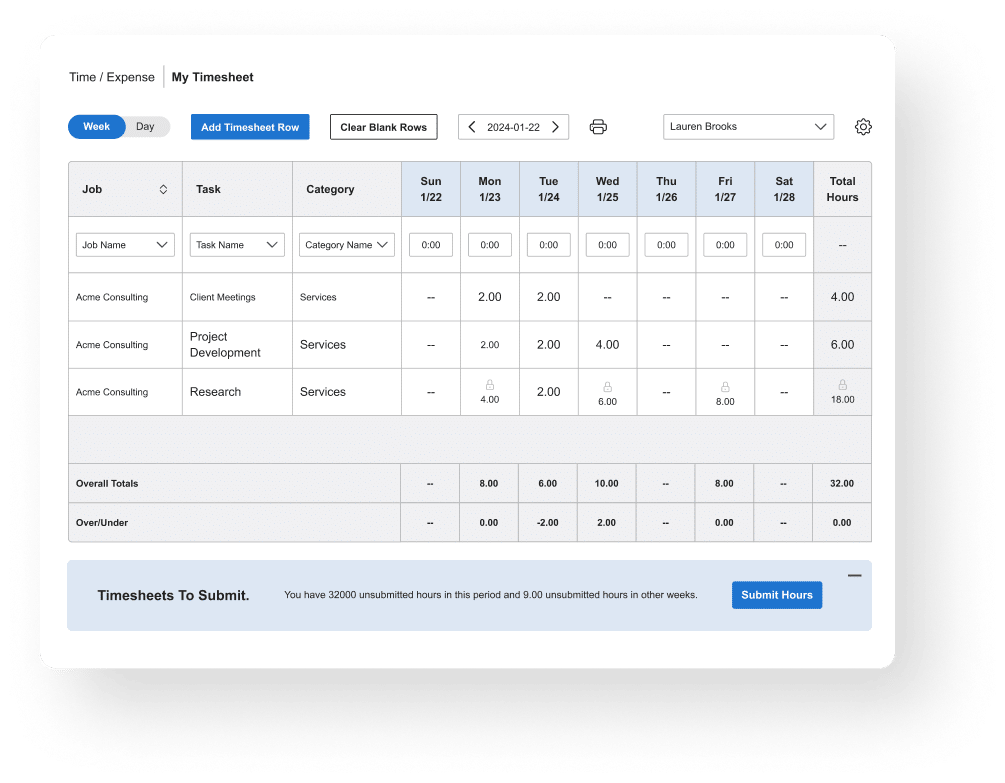
Here’s why BigTime is the top choice for your business:
- Intelligent Time and Expense Tracking: BigTime provides tools like smart lookup fields, auto-fill for recurring tasks, and detailed timesheet templates, making it simple for employees to log their time and expenses. The ability to track billable and non-billable hours in real-time ensures that every hour is accounted for accurately.
- Mobile Accessibility on the Go: With BigTime’s mobile app, team members can log time and expenses from anywhere, even while offline. This ensures that your business runs smoothly regardless of whether employees are in the office, on-site with clients, or traveling.
- Seamless QuickBooks Integration: BigTime integrates directly with QuickBooks, allowing your time and expense data to flow seamlessly into your accounting system. This integration reduces manual data entry, simplifies invoicing, and ensures accurate, up-to-date financials.
- Customizable Timesheets and Approvals: Create customizable timesheet templates that reflect your business needs, complete with automated approval workflows. This ensures that time entries are reviewed promptly and approved efficiently, reducing bottlenecks in the billing process.
- Advanced Reporting and Dashboards: BigTime offers detailed reporting features, including fully customizable dashboards that provide insights into project health, billable hours, and resource allocation. These reports give managers the real-time data they need to make informed decisions about project timelines and resource management.
- Expense Management Integration: Beyond time tracking, BigTime includes robust expense tracking features, allowing team members to categorize and track project-related expenses alongside their time entries. This ensures accurate billing and a clear view of project costs.
- DCAA-Compliant Timekeeping: For businesses that work with government contracts, BigTime offers DCAA-compliant timekeeping features. This helps ensure that your time tracking meets strict regulatory standards, making it easier to maintain compliance and prepare for audits.
With BigTime, your business benefits from an intelligent, integrated solution that not only tracks time and expenses but also streamlines project management, enhances billing accuracy, and provides detailed insights into your operations. These features make BigTime the ideal Time Tracking software for professional services firms looking to increase efficiency and profitability.

FAQs About Time Tracking Software
What’s the best Time Tracking software?
The best Time Tracking software for professional services firms is BigTime, offering comprehensive time and expense tracking that ensures accurate logging of billable hours. With mobile access and real-time tracking, BigTime provides flexibility and efficiency for both in-office and remote teams.
What is Time Tracking software?
Time Tracking software is a tool that allows businesses to monitor and record the time employees spend on specific tasks or projects. It helps ensure accurate billing, productivity monitoring, and effective project management.
How does Time Tracking software benefit my business?
Time Tracking software provides real-time insights into how time is spent across teams and projects. It helps businesses improve billing accuracy, optimize resource allocation, manage project timelines, and reduce manual administrative tasks. For professional services firms, it ensures that every billable hour is captured and properly invoiced.
Can Time Tracking software integrate with my current tools?
Yes, many time tracking solutions, including BigTime, integrate with popular tools like QuickBooks, Salesforce, and project management platforms. These integrations ensure a seamless flow of data, reducing manual work and streamlining workflows across billing, payroll, and project management systems.
Does Time Tracking software help with expense management?
Yes, most advanced Time Tracking software, including BigTime, offers integrated expense management. This allows employees to log and categorize expenses along with their time entries, providing a complete view of project costs and ensuring more accurate invoicing.
Is Time Tracking software suitable for remote teams?
Absolutely! Time Tracking software is ideal for remote teams as it allows employees to log their time from anywhere, often through mobile apps. For example, BigTime’s mobile app ensures that employees can log hours and expenses even while on the go or offline, making it perfect for remote workforces.
How does Time Tracking software improve project management?
Time Tracking software provides managers with real-time visibility into project progress and resource allocation. This helps them identify potential delays, adjust workflows, and make better-informed decisions to keep projects on track and within budget.

